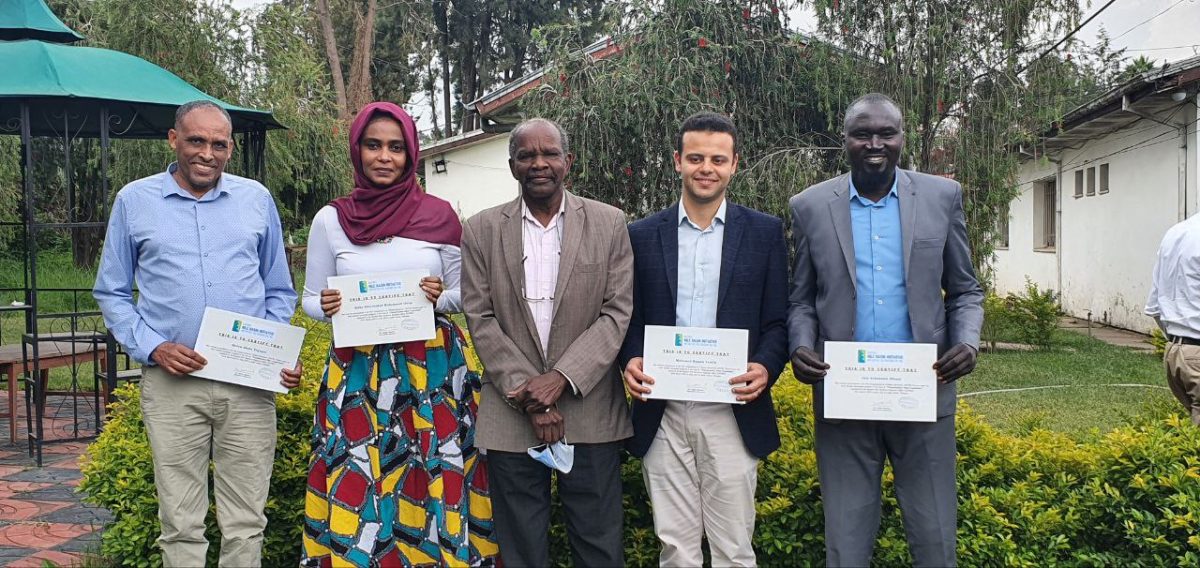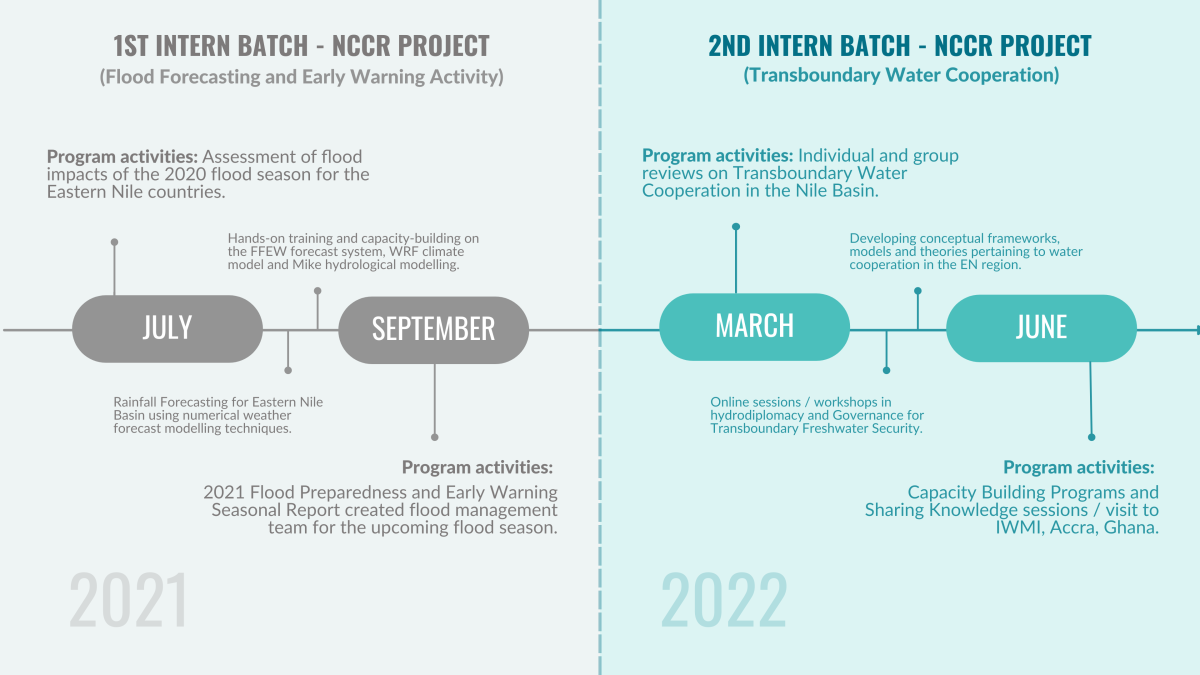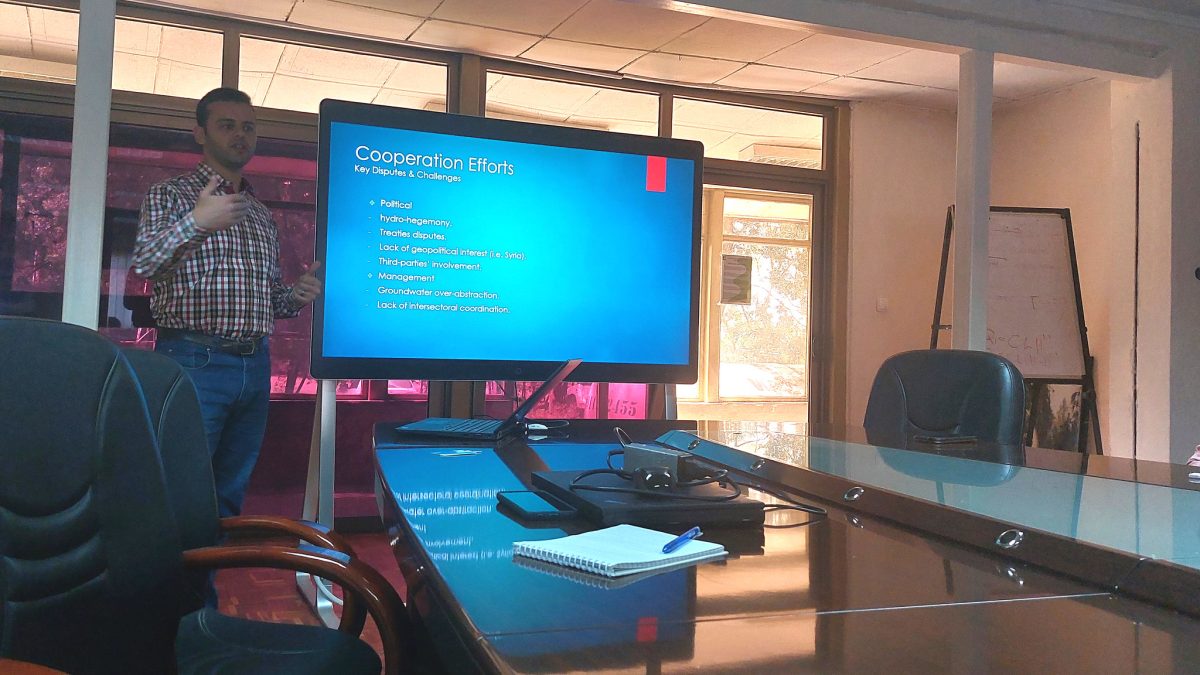THE NEXT GENERATION OF WATER PROFESSIONALS WORKING TOWARDS A NEW ERA OF COOPERATION
Posted in : Blog on 13 December 2022
Shared by 11 countries, the Nile River embodies both the current challenges and bountiful opportunities presented when managing a resource that supports over 230 million people across a broad spectrum of cultures, landscapes, and communities.
The Eastern Nile (EN) is a complex region. One where the intricacies of politics, culture and historical perception can often overshadow the technical solutions needed for effective, transboundary cooperation in river-related management and development.
Since 2011, as part of the Nile Basin Initiative (NBI) the Eastern Nile Technical Regional Office (ENTRO) in partnership with CIWA (Cooperation in International Waters in Africa) has run an internship program1 for the next generation of talented water professionals in the EN region. The primary focus of the internship program is establishing an enabling environment for transboundary water cooperation and a commitment to assembling an innovative, collaborative, and forward-thinking forum of young experts with the goal of stepping out of the shadow of historical, regional division and dispute, moving towards truly collaborative, climate resilient and sustainable approach to transboundary water management in the Eastern Nile Basin.

Hosting over 180 interns since its inception, the internship program has featured a range of project activities in the interest of transforming water management in the Eastern Nile. For example: encouraging collaboration across Eastern Nile universities, fostering collaboration in regional hydro-politics, developing tools to enrich the knowledge base, and connecting professional networks of water practitioners, policy makers and others in the sector throughout Africa and beyond.
One of the most important aspects of the program is capacity-building, which goes beyond simply developing new and existing skills, focusing also on changing perspectives and harnessing an unbiased, collaborative ethos geared towards applying holistic systems-thinking to find solutions to complex, regional water problems that transcend political boundaries.
Interns from a wide variety of backgrounds are given a platform, including water engineers, geologists, environmental scientists, and communications specialists from Eastern Nile Basin countries (Egypt, Ethiopia, South Sudan, and Sudan). With over 21% of interns being female, the ENTRO internship program is making steps towards empowering women to succeed and
innovate in a field traditionally dominated by men. Interns are selected based on their research interests, accolades, and technical specialism, each bringing unique and regional perspectives on the Nile as well as their technical expertise.
The Nile Cooperation for Climate Resilience (NCCR) project, launched in 2021, aims to improve mechanisms for cooperation on water resources management and development in the Nile Basin with focus on enabling a platform for cooperation, flood and drought risk mitigation, dam safety capacity building, innovative information services for climate-resilient investment planning, and water quality investment planning.
It’s a major capacity building program for young professionals. It improved my intellectual abilities, my social skills and broadened my network through the program. It pretty much paved the way for me to start planning what I’ll be looking for towards my future PhD studies.” Ethiopia Bisrat, Alumni 2018, Ethiopia, Environmental Engineer
“A very unique chance to learn about other cultures, challenges and different perspectives on transboundary waters” Mohamed Tawfik, Alumni 2022, Egypt, Water Resource Management Specialist

As part of the Nile Cooperation for Climate Resilience (NCCR) project2, the ENTRO internship program has run application cycles for two batches of interns from 2021 – 2022 each with their own primary focus. The first cycle interns (March-June 2022) focused primarily on the theme of Transboundary Water Cooperation while the second focused on Floods Forecasting and Early Warning.
An essential ingredient to capacity-building is about incubating meaningful and sustained transformational change that goes beyond policy and practice towards changing mindsets and attitudes. This is at the core ethos of CIWA as well as the ENTRO internship program, forging cross-cultural, cross-scale and cross-boundary partnerships for change and innovation.
“I acquired a lot of skills related to hydrological and hydraulic modeling. After the completion of this program, I started working as a water resource engineer and proposing solutions for flood risk management.” Ahmed Nasr, Alumni 2013, Egypt, Hydrologist Engineer
“Before starting the internship at ENTRO, I tended to focus only on my own country’s viewpoint. Working with the interns from the four other countries in the Eastern Nile Basin has made me think more regionally” Safa Abdalwhab, Sudan, Ministry of Irrigation and Water Resources
Two years ago, CIWA published a blog in celebration of World Youth Skills Day, honoring the 2019-2020 batch of ENTRO interns. The 2022 batch of interns have been involved in a variety of activities (see diagram) including participating in online seminars and collaborative workshops on topics like Intergenerational Hydrodiplomacy with the UPWCD and Governance for Freshwater Security with the Global Water Partnership (GWP). Additionally, interns were given the chance to present their ideas and perspectives on certain water-related challenges both individually and as groups, truly fostering a culture of collaboration and community in that they can transfer into their careers as practitioners.
“It has been a real eye-opener to network and have discussions with bright minds from all the countries in the Eastern Nile Basin. Not only the interns but also the ENTRO staff from Ethiopia and beyond” Mohamed Tawfik, Egypt, Water Resource Management Specialist
“The young generation will inherit senior positions in the water sector and move together in this social way and resolve water issues together” Jale Yuggu, South Sudan, Ministry of Water Resources, and Irrigation

Hamad delivering a talk on transboundary cooperation efforts in the Eastern Nile Basin as part of the individual output projects produced by interns.
Moving forward
ENTRO plans to recruit additional batches of interns during 2022-2023 under the Nile Cooperation for Climate Resilience project. Interns will work on multidisciplinary themes which have critical importance to the Eastern Nile Basin in terms of water resources development and management. Further, ENTRO plans to prepare an internship guideline document based on a decade of experience on the program to use as a guidance for future enrolment of Interns and Young Professionals and sustain the program implementation. The document can serve other centers, such as the Nile Basin Discourse (NBD) to align their internship guidelines with the NBI-wide internship and young professional program.
Says Dr Elias Tedla, Internship Coordinator at ENTRO, “As the (internship) program has been running for over a decade, there is not only an opportunity for the expansion of multi-sectoral, professional networks and partnerships, but also intergenerational communication and mentoring between subsequent intern batches.”
ENTRO plans to organize alumni workshops as well as build a social media platform to invite past and future interns to join an alumni portal. This would offer an opportunity to build professional relationships and networking with counterparts across the Eastern Nile region. Additionally, the program will elect principal representatives from each of the four EN countries who will organize and engage with interns and remain in direct communication with ENTRO.
Today the internship program has contributed greatly towards equipping the next generation of water professionals in the Eastern Nile region with the necessary skills and tools to apply their knowledge in real-time, This in turn has allowed a platform to work on complex, multi-sectoral problems of the Eastern Nile water resources, and help build pathways to successful transboundary water cooperation.
_______________________________________________________________________________________________________________________________________
1 Two years ago, CIWA published a blog in celebration of World Youth Skills Day, honoring the 2019-2020 batch of ENTRO interns.
2 The Nile Cooperation for Climate Resilience (NCCR) project, launched in 2021, aims to improve mechanisms for cooperation on water
resources management and development in the Nile Basin with focus on enabling a platform for cooperation, flood and drought risk mitigation, dam safety capacity building, innovative information services for climate-resilient investment planning, and water quality investment planning.


